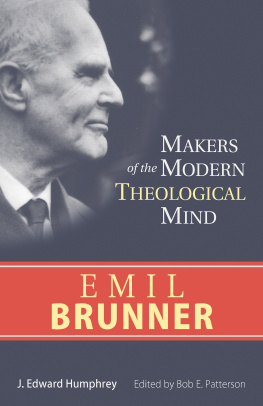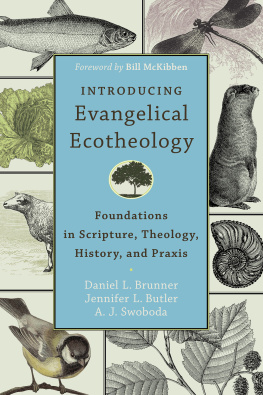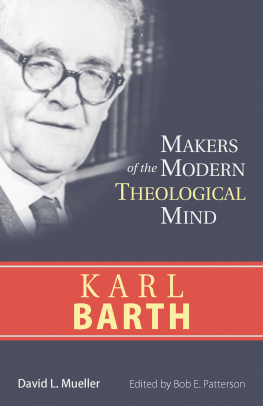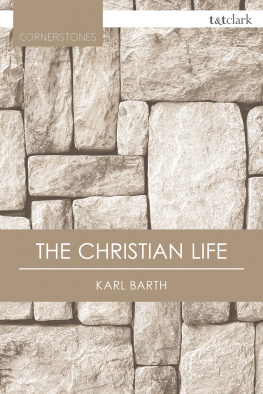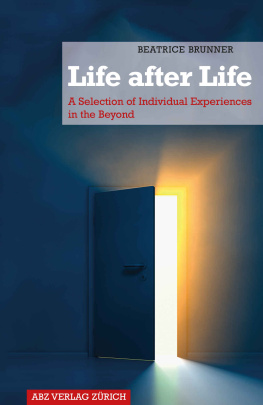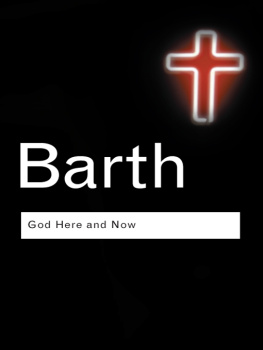Makers of the Modern Theological Mind: Emil Brunner (eBook edition)
1976 by Hendrickson Publishers Marketing, LLC
P. O. Box 3473
Peabody, Massachusetts 01961-3473
eBook ISBN 978-1-61970-878-5
All rights reserved. No part of this book may be reproduced or transmitted in any form or by any means, electronic or mechanical, including photocopying, recording, or by any information storage and retrieval system, without permission in writing from the publisher.
Due to technical issues, this eBook may not contain all of the images or diagrams in the original print edition of the work. In addition, adapting the print edition to the eBook format may require some other layout and feature changes to be made.
Unless otherwise noted, all Scripture quotations are taken from the American Standard Version, 1901.
The quotation marked RSV is from The Revised Standard Version of the Bible, copyrighted 1946, 1952, and 1971, 1973 by the Division of Christian Education of the National Council of the Churches of Christ in the U.S.A. and is used by permission.
Grateful acknowledgment is hereby made for permission to quote from the following published works:
To The Macmillan Company, New York, for permission to quote from TheTheologyof Emil Brunner, edited by Charles W. Kegley, copyright 1962 by Charles W. Kegley.
To The Westminster Press, Philadelphia, for permission to quote from The Christian Doctrine of God, by Emil Brunner, translated by Olive Wyon, copyright 1950 by W. L. Jenkins; The Christian Doctrine of Creation and Redemption, by Emil Brunner, translated by Olive Wyon, first published in English, 1952, by Lutterworth Press, London; The Christian Doctrine of the Church, Faith, and the Consummation, by Emil Brunner, translated by David Cairns in collaboration with T. H. L. Parker, copyright 1962 by Lutterworth Press; Man in Revolt, by Emil Brunner, translated by Olive Wyon, copyright 1947 by W. L. Jenkins; The Divine Imperative, by Emil Brunner, translated by Olive Wyon, copyright 1947 by W. L. Jenkins; Revelation and Reason, by Emil Brunner, translated by Olive Wyon, copyright 1946 by W. L. Jenkins; The Mediator, by Emil Brunner, translated by Olive Wyon, copyright 1947, by W. L. Jenkins; Truth as Encounter, by Emil Brunner (revised and enlarged edition of The Divine-Human Encounter), translated by Amandus W. Loos, and David Cairns in consultation with T. H. L. Parker, copyright 1943 by The Westminster Press, and 1964 by W. L. Jenkins; The Misunderstanding of the Church, by Emil Brunner, translated by Harold Knight, copyright 1953 by W. L. Jenkins; Eternal Hope, by Emil Brunner, translated by Harold Knight, published, 1954, by The Westminster Press.
First eBook edition April 2016
Cover Photo Credit: Courtesy of the Center for Barth Studies at Princeton Theological Seminary on behalf of the Karl Barth Stiftung of Basel, Switzerland.
For Rachel
dear companion in
life and faith
Publishers Preface (2016)
The Makers of the Modern Theological Mind series was first published in the early 1970s and comprises eighteen volumes, each looking at the life and work of a highly influential modern theologian. Todays reader may wonder why we are reprinting these books after so many years, especially since much has been written in the intervening decades on most of these theologians. The answer is that Hendrickson Publishers remains committed to serving the church in theological education, and we believe the original series editors purpose still holds true: These books will give a new generation the opportunity to be exposed to significant minds.
While readers may notice that some word choices and writing styles are dated, we chose to leave the original text intact in order to preserve the historical integrity of the books. Additionally, although the series represents a specific perspective in modern Western thought, these theologians nevertheless serve as forerunners to the many outstanding theological voices we hear in todays much broader perspective. It is for their sake and the sake of new generations that we are reprinting this series, thereby ensuring continued accessibility to these formative and important modern theologians.
Another unique feature of this series is that many of the authors studied with the particular theologian about whom they wrote. And because some of these books were written almost half a century agopublished during the political and social turmoil of the latter decades of the twentieth centurythey also serve as historical accounts of how these theologians impacted the authors at the time that they themselves were writing.
We are confident that readers will continue to find these books interesting and useful, which is why we are releasing them with a new look and in paperback and also as e-books. As these theologians continue to influence the global church, this series remains a helpful overview of their historical context and their lifes work.
Patricia Anders, Editorial Director
Hendrickson Publishers
Editors Preface (1972)
Who are the thinkers that have shaped Christian theology in our time? This series tries to answer that question by providing a reliable guide to the ideas of the men who have significantly charted the theological seas of our century. In the current revival of theology, these books will give a new generation the opportunity to be exposed to significant minds. They are not meant, however, to be a substitute for a careful study of the original works of these makers of the modern theological mind.
This series is not for the lazy. Each major theologian is examined carefully and criticallyhis life, his theological method, his most germinal ideas, his weaknesses as a thinker, his place in the theological spectrum, and his chief contribution to the climate of theology today. The books are written with the assumption that laymen will read them and enter into the theological dialogue that is so necessary to the church as a whole. At the same time they are carefully enough designed to give assurance to a Ph.D. student in theology preparing for his preliminary exams.
Each author in the series is a professional scholar and theologian in his own right. All are specialists on, and in some cases have studied with, the theologians about whom they write. Welcome to the series.
Bob E. Patterson, Editor
Baylor University
Authors Preface
The invitation to undertake an analysis of the theology of Emil Brunner evokes a glad response on my part. It affords an opportunity to reflect more deeply upon the thought of one who has been a truly formative influence in my own theological development. During my student days in the nineteen forties, I listened with uncommon intensity to a series of lectures by this great man and realized that I was being exposed to an unusual mind and spirit. In the succeeding months and years, the reading of one and another of his many books always left me with a growing sense of affinity for his way of thinking, the result being that his Dogmatics eventually provided, in large measure, the basic structure of introductory courses in my own teaching of theology.
On the other hand, this project cannot but leave me with some apprehension from the very beginning. There is the twofold obligation to be objectively critical in analysis and at the same time try to do justice to the thought and intention of a Christian thinker of Brunners stature. Distinguished theologians have reacted in one way and another to various aspects of Brunners thought. This little volume will have served its supreme purpose if it assists in attracting others to a first-hand reading of Brunners own works and thereby to a deeper desire for that exposure to truth which he describes as encounter.

